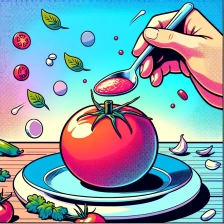In detail, for those interested!
Potato Reproduction Power
Potatoes have a remarkable reproductive power. This underground vegetable is capable of multiplying asexually through the tubers it produces. Each tuber contains eye buds, from which new shoots can emerge. When these tubers are planted in favorable conditions, they can give birth to new potato plants. This process of vegetative multiplication is widely used in agriculture to produce potato plants identical to the mother plant, ensuring genetic continuity.
Optimal conditions for germination
The germination of potatoes is favored by certain specific environmental conditions. To begin with, an adequate temperature is essential. In general, a temperature of approximately 15 to 20 degrees Celsius is ideal for the germination of potato tubers.
In addition to temperature, humidity also plays a crucial role in the germination process. A relative humidity of about 90% is recommended for the proper development of potato sprouts. This ensures that the tubers remain sufficiently hydrated to allow for the growth of shoots.
Soil quality is another determining factor for the germination of potatoes. Loose and well-drained soil is optimal because it allows the roots to easily develop and absorb the necessary nutrients for plant growth.
Finally, light is an element to consider during the germination of potatoes. Although tubers generally require darkness to avoid the formation of chlorophyll, once the sprouts have emerged, they need light to carry out photosynthesis and ensure their growth.
In summary, favorable conditions for the germination of potatoes include adequate temperature, sufficient humidity, quality soil, and exposure to light once the sprouts have started to grow.
Role of plant hormones in germination
Plant hormones play a crucial role in the process of potato germination. One of the most important hormones involved in this process is auxin. Auxin is produced in the potato buds and is transported to growth areas, such as the buds of the tuber eyes.
Auxin stimulates cell growth, which is essential for germ formation. It also promotes cell elongation, allowing the germs to push through the potato skin. By working in conjunction with other plant hormones such as gibberellin, auxin helps coordinate the processes of cell division and differentiation necessary for germination.
Cytokinin is another plant hormone involved in potato germination. It stimulates cell division and tissue growth, contributing to germ formation and growth. By regulating the balance between auxin and cytokinin, potatoes can effectively control the germination process to ensure optimal germ growth.
In summary, plant hormones such as auxin and cytokinin play an essential role in potato germination by regulating cell growth, differentiation, and germ development. These processes coordinated by plant hormones allow potatoes to sprout and give rise to new plants.
Consequences of potato sprouting
When potatoes sprout, it can have important consequences. Sprouting tubers lose their nutritional quality as the starch is used to provide energy to the new shoot. The texture of the potato can also be affected, becoming softer and less pleasant to eat. Furthermore, sprouted potatoes can produce toxic substances such as solanine, a natural plant defense compound against predators. Solanine can cause gastrointestinal problems, headaches, and more serious issues if ingested in large quantities. That's why it is recommended not to consume sprouted potatoes and to remove the sprouts before cooking them. Additionally, tubers that have started to sprout are more susceptible to diseases and do not keep as long as non-sprouted potatoes.
![Explain why some countries change time zones?]()
![Explain why Alexander the Great refused to wear shoes.]()
![Explain why Alexander the Great always wore an impressive helmet.]()
![Explain why the last Chinese emperor was so young when he came to power?]()





















